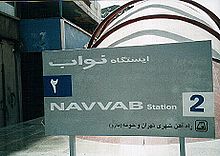Navvab Safavi
Navvab Safavi ( Persian سید مجتبی نواب صفوی, DMG Seyyed Moǧtabā Nawwāb-e Ṣafawī ; born in 1924 in Chānīābād in the province of Tehran ; died on December 25, 1955 ) was an Islamic theology student and hit man who founded the Islamist group Fedajin-e Islam ( Those who sacrifice themselves for Islam ) in 1946 . The aim of this movement was the “purification” of Islam by murdering public figures in Iran in the tradition of the assassins .
biography
Safavi was born in a village in Tehran Province . He studied in Najaf , Iraq, and briefly worked for the petroleum industry in Abadan .
At the age of 22, Navvab Safavi founded the Islamist organization Fedayeen-e Islam and began his missionary work to recruit like-minded people. Like many parts of the Muslim Brotherhood, Safavi believed in the so-called "purification of Islam" from negative elements. As a method to achieve his goal, he chose the targeted killing of hostile people who were preferably associated with the Shah Mohammad Reza Pahlavi . During his lifetime, his organization was responsible for the mostly fatal attacks on these people: Ahmad Kasravi (1945, † 1946), Shah Pahlavi (1949, survived), Abdolhossein Hazhir († 1949), Haj Ali Razmara († 1951), Ahmad Zanganeh († 1951), Hossein Fatemi († 1952) and Hossein Ala (1955, survived).
Safavi and his group were closely associated with the Shiite cleric Ayatollah Abol-Ghasem Kashani , but the Fedayeen-e Islam were never part of the National Front , a party of Mohammad Mossadegh .
During a funeral on November 22, 1955, the attempt on the politician Hossein Ala, who had only been Iran's prime minister for a short time at the time of the attack, failed, and Safavi was arrested. Safavi and three other members of the Fedayeen-e Islam were in the process condemned to death , and on 25 December 1955 executed . In Iran Safavi is considered to be martyrs in Tehran is a metro station named after him.
literature
- Sohrab Behdad: Islamic Utopia in Pre-Revolutionary Iran: Navvab Safavi and the Fada'ian-e Eslam. In: Middle Eastern Studies 33 (1997), Issue 1, pp. 40-65.
| personal data | |
|---|---|
| SURNAME | Safavi, Navvab |
| ALTERNATIVE NAMES | Mir-Lowhi, Mojtaba |
| BRIEF DESCRIPTION | Iranian founder of the Islamist group Fedayeen-e Islam |
| DATE OF BIRTH | 1924 |
| PLACE OF BIRTH | Chānīābād in Tehran Province |
| DATE OF DEATH | December 25, 1955 |

